必修一(Unit2 English around the world the 7th period)
高中英语 Unit 2 English around the world Reading The road to modern English教学设计 新人教版必修1
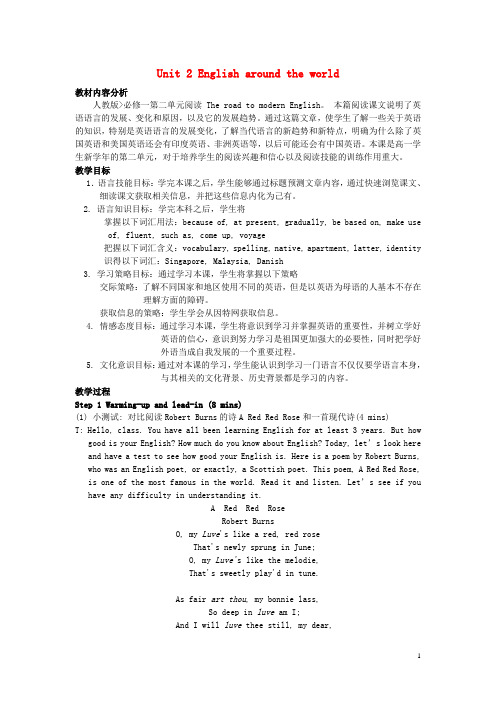
Unit 2 English around the world教材内容分析人教版>必修一第二单元阅读The road to modern English。
本篇阅读课文说明了英语语言的发展、变化和原因,以及它的发展趋势。
通过这篇文章,使学生了解一些关于英语的知识,特别是英语语言的发展变化,了解当代语言的新趋势和新特点,明确为什么除了英国英语和美国英语还会有印度英语、非洲英语等,以后可能还会有中国英语。
本课是高一学生新学年的第二单元,对于培养学生的阅读兴趣和信心以及阅读技能的训练作用重大。
教学目标1.语言技能目标:学完本课之后,学生能够通过标题预测文章内容,通过快速浏览课文、细读课文获取相关信息,并把这些信息内化为己有。
2. 语言知识目标:学完本科之后,学生将掌握以下词汇用法:because of, at present, gradually, be based on, make use of, fluent, such as, come up, voyage把握以下词汇含义:vocabulary, spelling, native, apartment, latter, identity 识得以下词汇:Singapore, Malaysia, Danish3. 学习策略目标:通过学习本课,学生将掌握以下策略交际策略:了解不同国家和地区使用不同的英语,但是以英语为母语的人基本不存在理解方面的障碍。
获取信息的策略:学生学会从因特网获取信息。
4. 情感态度目标:通过学习本课,学生将意识到学习并掌握英语的重要性,并树立学好英语的信心,意识到努力学习是祖国更加强大的必要性,同时把学好外语当成自我发展的一个重要过程。
5. 文化意识目标:通过对本课的学习,学生能认识到学习一门语言不仅仅要学语言本身,与其相关的文化背景、历史背景都是学习的内容。
教学过程Step 1 Warming-up and lead-in (8 mins)(1) 小测试: 对比阅读Robert Burns的诗A Red Red Rose和一首现代诗(4 mins)T: Hello, class. You have all been learning English for at least 3 years. But how good is your English? How much do you know about English? Today, let’s look here and have a test to see how good your English is. Here is a poem by Robert Burns, who was an English poet, or exactly, a Scottish poet. This poem, A Red Red Rose, is one of the most famous in the world. Read it and listen. Let’s see if you have any difficulty in understanding it.A Red Red RoseRobert BurnsO, my Luve's like a red, red roseThat's newly sprung in June;O, my Luve's like the melodie,That's sweetly play'd in tune.As fair art thou, my bonnie lass,So deep in luve am I;And I will luve thee still, my dear,Till a' the seas gang dry.Till a' the seas gang dry, my dear,And the rocks melt wi' the sun;I will luve thee still, my dear,While the sands o' life shall run.And fare thee well, my only Luve!And fare thee well, a while!And I will come again, my Luve,Tho' it were ten thousand mile!T: Did you find it easy or difficult? What about this one? This poem was written by a modern writer.I Am Not YoursI am not yours, not lost in you,Not lost, although I long to beLost as a candle lit at noon,Lost as a snowflake in the sea.You love me, and I find you stillA spirit beautiful and bright,Yet I am I, who long to beLost as a light is lost in light.Oh plunge me deep in love—put outMy senses, leave me deaf and blind,Swept by the tempest of your love,A taper in a rushing wind.T: Why is the first poem difficult to understand while the second one not? (Mainly because of some of the words used in the first poem, which are not often used now. Robert Burns lived in the 18th century while the writer of the second poem is a modern poet.) So we can see people in the past used different words from what is used today.(2) 听一段一位学生和来自澳大利亚的外教的对话(4 mins)T: Now, when one day Qiu Zhensong met our foreign teacher Zak, who is from Australia, what happened? Let’s welcome Zak and Qiu Zhensong.(After the dialogue, the foreign teacher explained.) Did you understand our dialogue? (Ss: No.) What’s the difficulty? (Different words were used in Australia which you do not know in American or British English.) T: So from the two poems and the dialogue we can see people from different countries speak different English and people in different times also use different English. How did the difference come about?[意图说明] 引入话题:不同时代、不同国家所使用的英语有所不同。
人教版高中英语必修一 Unit2English around the world

人教版高中英语必修一Unit2English around theworld人教版高中英语必修一Unit2English around the world 的单词和词组练习一、基本词汇:n. :1) elevator 电梯2) gas气体;汽油;煤气;毒气3) apartment(美)公寓4) spelling拼写;拼法5) Singapore新加坡6) lorry(英)卡车7) lightning闪电8) cab出租车9) petrol(英)汽油10)voyage航行;航海11)vocabulary词汇;词汇量;词汇表12)identity本身;本体;身份13)Malaysia马来西亚;马来群岛14)accent口音;腔调;重音15)block街区;块;木块;石块adj. :1) latter较后的;后半的;(两者中)后者的2) African非洲的;非洲人的;非洲语言的3) southeastern东南方的4) Midwestern中西部;有中西部特征的5) eastern东部的;东方的6) northwestern西北方的n./v. :1)base以……为基础;基部;基地;基础2)mand命令;指令;掌握;命令;指挥;支配3)request请求;要求n./adj.:1)native本地人;本国人;本国的;本地的2)Danish丹麦语;丹麦的;丹麦人的;丹麦语的3)Spanish西班牙人;西班牙语;西班牙的;西班牙人的;西班牙语的adj/adv.1) straight直接;挺直;直的;笔直的;正直的二、重点词汇:1) use n&v. 用处;使用 usage n.用法;词语惯用法2) express v.表达 expression n.词语;表达;表情3) recognize v. 辨认出;承认 recognition n.认出;识别;承认4) actually adv. 实际上 actual adj.实际上的5) graadually adv. 逐渐地;逐步地 gradual adj.逐渐的;逐步的6) fulently adv. 流利地 fluency n.流利;流畅 fulent adj.流利的7) frequently adv. 常常;频繁地 frequent adj.频繁的;常见的8) office n. 办公室 official adj.官方的三、重点短语:1) because of… 由于;因为because of和 because的区别:beccause of(后接词组或单词)because (作连词,后跟句子)eg:He was late not only because of his illness but also because he missed the train.不仅因为他的病痛而且因为他误了火车他才迟到的。
高一英语必修一Unit 2课文翻译
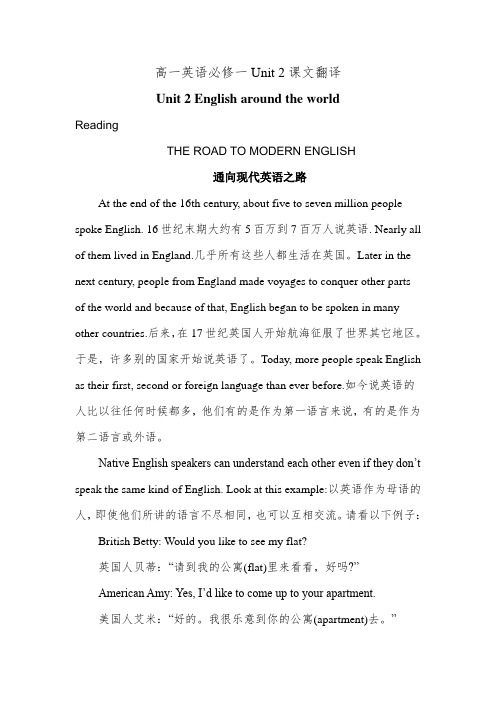
高一英语必修一Unit 2课文翻译Unit 2 English around the worldReadingTHE ROAD TO MODERN ENGLISH通向现代英语之路At the end of the 16th century, about five to seven million people spoke English. 16世纪末期大约有5百万到7百万人说英语. Nearly all of them lived in England.几乎所有这些人都生活在英国。
Later in the next century, people from England made voyages to conquer other partsof the world and because of that, English began to be spoken in many other countries.后来,在17世纪英国人开始航海征服了世界其它地区。
于是,许多别的国家开始说英语了。
Today, more people speak English as their first, second or foreign language than ever before.如今说英语的人比以往任何时候都多,他们有的是作为第一语言来说,有的是作为第二语言或外语。
Native English speakers can understand each other even if they don’t speak the same kind of English. Look at this example:以英语作为母语的人,即使他们所讲的语言不尽相同,也可以互相交流。
请看以下例子:British Betty: Would you like to see my flat?英国人贝蒂:“请到我的公寓(flat)里来看看,好吗?”American Amy: Yes, I’d like to come up to your apartment.美国人艾米:“好的。
人教版高中英语必修一 Unit2 English around the。world 说课稿

人教版高中英语必修一 Unit2 English around the。
world 说课稿Step 2 Pre-reading预读在本课的预环节,我会让学生先阅读课文标题和开头,引导学生思考本文的主题和内容,并提出问题,激发学生的阅读兴趣。
Step 3 While-reading阅读在阅读环节,我会让学生先快速阅读全文,然后再细读,帮助学生理解文中的重点内容和语言表达方式。
同时,我会引导学生掌握一些阅读技巧,如划重点、圈关键词等。
Step 4 Post-reading课文后续在课文后续环节,我会让学生完成一些阅读任务,如完成课文中的填空题、选择题等,帮助学生巩固所学知识,并提高他们的阅读能力。
Step 5 n讨论在讨论环节,我会让学生分组进行小组讨论,就课文中的主题展开讨论,并让学生分享自己的看法和观点,帮助学生提高口语表达能力。
Step 6 Summary总结在课程总结环节,我会让学生回顾本节课的研究内容和收获,并提出一些问题,帮助学生进一步加深对所学知识的理解和掌握。
七.板书设计本节课的板书设计如下:Unit 2 English around the worldXXXEnglish varietiesBritish English vs。
American English八.教学反思通过本节课的教学,我发现学生对于英语在世界上的发展和各种特色英语的了解有了更深入的认识,并且学生的阅读能力和口语表达能力也得到了提高。
同时,我也发现在教学过程中,有些学生仍然存在害羞不愿开口说英语的问题,我会在以后的课堂中继续引导学生多多开口,提高他们的英语口语表达能力。
高一英语必修一Unit2课文翻译
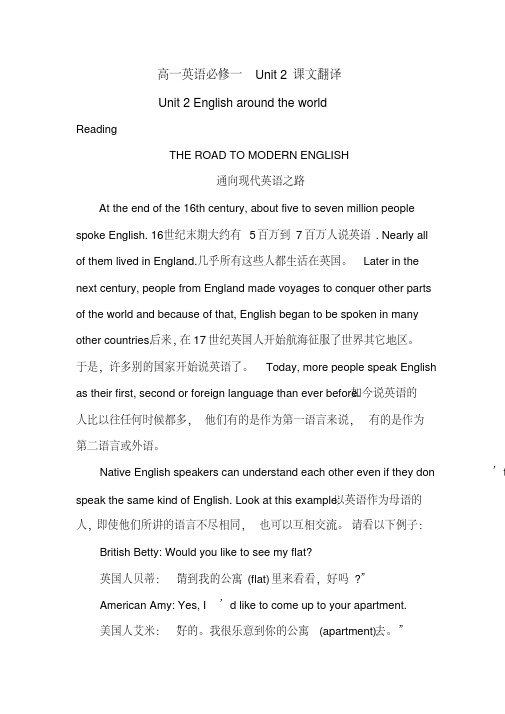
高一英语必修一Unit 2课文翻译Unit 2 English around the worldReadingTHE ROAD TO MODERN ENGLISH通向现代英语之路At the end of the 16th century, about five to seven million peoplespoke English. 16世纪末期大约有5百万到7百万人说英语. Nearly allof them lived in England.几乎所有这些人都生活在英国。
Later in thenext century, people from England made voyages to conquer other partsof the world and because of that, English began to be spoken in manyother countries.后来,在17世纪英国人开始航海征服了世界其它地区。
于是,许多别的国家开始说英语了。
Today, more people speak Englishas their first, second or foreign language than ever before.如今说英语的人比以往任何时候都多,他们有的是作为第一语言来说,有的是作为第二语言或外语。
Native English speakers can understand each other even if they don’t speak the same kind of English. Look at this example:以英语作为母语的人,即使他们所讲的语言不尽相同,也可以互相交流。
请看以下例子:British Betty: Would you like to see my flat?英国人贝蒂:“请到我的公寓(flat)里来看看,好吗?”American Amy: Yes, I’d like to come up to your apartment.美国人艾米:“好的。
人教版高一英语必修一《Unit 2 English around the world》评课稿
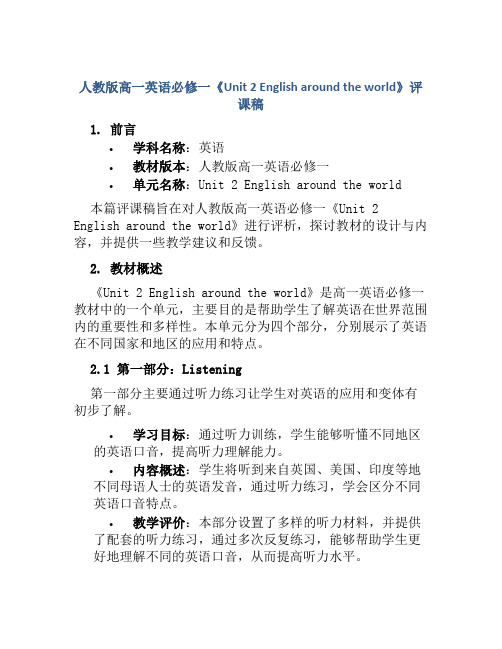
人教版高一英语必修一《Unit 2 English around the world》评课稿1. 前言•学科名称:英语•教材版本:人教版高一英语必修一•单元名称:Unit 2 English around the world 本篇评课稿旨在对人教版高一英语必修一《Unit 2 English around the world》进行评析,探讨教材的设计与内容,并提供一些教学建议和反馈。
2. 教材概述《Unit 2 English around the world》是高一英语必修一教材中的一个单元,主要目的是帮助学生了解英语在世界范围内的重要性和多样性。
本单元分为四个部分,分别展示了英语在不同国家和地区的应用和特点。
2.1 第一部分:Listening第一部分主要通过听力练习让学生对英语的应用和变体有初步了解。
•学习目标:通过听力训练,学生能够听懂不同地区的英语口音,提高听力理解能力。
•内容概述:学生将听到来自英国、美国、印度等地不同母语人士的英语发音,通过听力练习,学会区分不同英语口音特点。
•教学评价:本部分设置了多样的听力材料,并提供了配套的听力练习,通过多次反复练习,能够帮助学生更好地理解不同的英语口音,从而提高听力水平。
•建议与反馈:为了进一步提高学生的听力理解能力,可以增加一些真实英语对话的听力材料,并提供更多的听力练习题,引导学生进行听力训练。
2.2 第二部分:Speaking第二部分通过讲话和对话的练习,提高学生的口语表达能力以及交际能力。
•学习目标:通过课堂练习,学生能够模仿并正确运用英语口音和语调,并能够进行简单的英语对话和交流。
•内容概述:学生将练习模仿英美人士的英语发音,进行有关英语使用的对话练习,如问路、订购食物等场景。
•教学评价:本部分通过组织学生进行角色扮演和小组对话的方式,有效地锻炼了学生的口语表达能力,激发了学生的兴趣和参与度。
•建议与反馈:为了提高学生的口语表达水平,可以增加一些生活化实用的对话练习,如购物、旅行等场景,让学生更好地应用所学知识。
人教高中英语必修一unit-2-English-around-the-world-单词讲解

latest adj.最新的;最近的;最后的 lately(=recently) adv.最近;近来
选词填空(latter/later/late/lately/latest) ①Here are Tom and David; the _l_a_t_te_r__ is my
04 come up
come up①_上__来__,走__近_②__被__提_出____ ③__发_生__,__出__现___④__发__芽____
英译汉 (1)A foreigner came up to me and asked me the way to the railway station. 一个外国人走到我面前问我去火车站的路。 (2)The grass is just beginning to come up.
(1)vt. 以……为根据
base... on/upon 把……建立在……的基础上 be based on/upon 以……为基础/依据
(2)n.基部;基地;基础 at the base of 以……为基点;在……的底部
1.你不应该把自己的快乐建立在别人的痛苦之上。
You shouldn’t base your happiness on/upon the other’s sadness.
④The koala(考拉) is native ___to____Australia.
____考__拉__原___产__于__澳__大__利__亚__。________________________
请替换文字内容
点击添加相关标题文字,点击添加相关标题文字,点击添加相关标题 文字,点击添加相关标题文字,点击添加相关标题文字。
必修一unit_2_English_around_the_world_重点单词、短语和句型
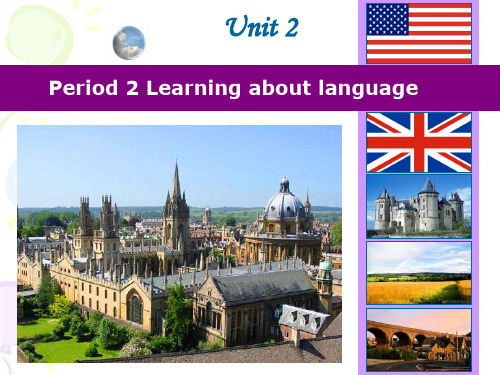
Mr.Smith has a good command of spoken English.
史密斯先生对英语口语掌握得很好。
归纳总结 command v. & n.命令;指挥;掌握;博得 ___________________ 。
(1)at one's command 听某人支配
under one’s command 由……指挥
Similar National Flags
The United Kingdom of Great Britain and Northern Ireland
The Commonwealth of Australia
New Zealand
4.recognize
recognize Although many Americans move a lot,they still_______ and understand each other’s dialects.
under the command of sb. 在……指挥之下
have (a) command of 掌握;精通(尤指语言) take command of 控制 (be) in command of 掌握,控制 (2)command sb.to do sth. 命令某人做某事 command that...(should) do... 命令……
观察思考
Line up these men and see if the witness can recognize
the criminal. 让这些人站成一排,看看证人能否从中把罪犯认出来。 I recognized him though we were apart for years. 尽管我们分开多年了,我还是认出了他。
高中英语 必修1 (Unit2 English around the world the 5th period) 精品教案
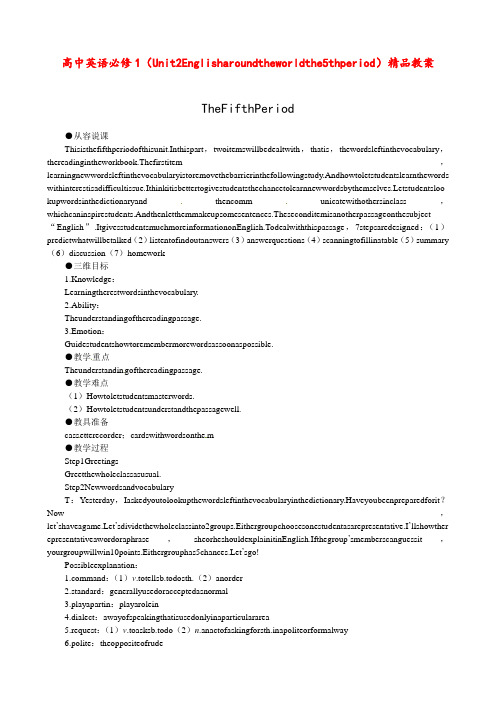
高中英语必修1(Unit2Englisharoundtheworldthe5thperiod)精品教案TheFifthPeriod●从容说课Thisisthefifthperiodofthisunit.Inthispart,twoitemswillbedealtwith,thatis,thewordsleftinthevocabulary,thereadingintheworkbook.Thefirstitem,learningnewwordsleftinthevocabularyistoremovethebarrierinthefollowingstudy.Andhowtoletstudentslearnthewords withinterestisadifficultissue.Ithinkitisbettertogivestudentsthechancetolearnnewwordsbythemselves.Letstudentsloo kupwordsinthedictionaryand thencomm unicatewithothersinclass,whichcaninspirestudents.Andthenletthemmakeupsomesentences.Theseconditemisanotherpassageonthesubject “English”.ItgivesstudentsmuchmoreinformationonEnglish.Todealwiththispassage,7stepsaredesigned:(1)predictwhatwillbetalked(2)listentofindoutanswers(3)answerquestions(4)scanningtofillinatable(5)summary (6)discussion(7)homework●三维目标1.Knowledge:Learningtherestwordsinthevocabulary.2.Ability:Theunderstandingofthereadingpassage.3.Emotion:Guidestudentshowtoremembermorewordsassoonaspossible.●教学重点Theunderstandin gofthereadingpassage.●教学难点(1)Howtoletstudentsmasterwords.(2)Howtoletstudentsunderstandthepassagewell.●教具准备cassetterecorder;cardswithwordsonthe m●教学过程Step1GreetingsGreetthewholeclassasusual.Step2NewwordsandvocabularyT:Yesterday,Iaskedyoutolookupthewordsleftinthevocabularyinthedictionary.Haveyoubeenpreparedforit?Now,let’shaveagame.Let’sdividethewholeclassinto2groups.Eithergroupchoosesonestudentasarepresentative.I’llshowther epresentativeawordoraphrase,sheorheshouldexplainitinEnglish.Ifthegroup’smemberscanguessit,yourgroupwillwin10points.Eithergrouphas5chances.Let’sgo!Possibleexplanation:mand:(1)v.totellsb.todosth.(2)anorder2.standard:generallyusedoracceptedasnormal3.playapartin:playarolein4.dialect:awayofspeakingthatisusedonlyinaparticulararea5.request:(1)v.toasksb.todo(2)n.anactofaskingforsth.inapoliteorformalway6.polite:theoppositeofrude7.retell:totellastoryagainorinadifferentform8.accent:awayofsayingwordsthatshowswhatcountry,esfrom9.recognize:toknowwhothepersonis10.eastern:inorfromtheeast ofacountryorplaceT:Welldone!Nowlet’sdealwiththesomeofthewordsandphrasesindeal.mandv.命令,指挥commandsb.todo;commandsth.;博得,应得commandthat-clausee.g.Hecommandedhismantoretreat.ThetroopswerecommandedbyGerneralHaig.Thekingcommandedthatshe(should)beexecuted.(建议,命令,要求一类词后从句中用虚拟语气,此类动词有suggest,advise,order,request,require,command,demand...)Hecommanded thebuilding(should)betorndown.n.命令[C];指挥,控制[U]e.g.Areyourefusingtoobeymycommands?Youmustobeyhiscommandthatthebuilding(should)betorndown.Takecommandof;beincommand;underone’scommand;underthecommandofsb.e.g.Shetookcommandofthisclassaftertheformermanagerleft.Shefeltincommandofherlife.ThebattleshipisunderthecommandofCaptainBlake.2.requestv.requeststh.(fromsb.);requestsb.todo;requestthat-clausee.g.Youcanrequestafreecopyoftheleaflet(宣传单).Youarerequestednottosmokeintherestaurant.Sherequestedthatnoone(should)betoldofherdecision untilthenextmeeting.n.request(forsth.);request(that)e.g.Requestsforvisaswillbedealtwithwithin48hours.Herrequestthatmoresweetsbeservedwasrefused.3.recognize辨认出;意识到;承认recognizesb./sth.(by/fromsth.)通过……认出……;recognizesth.(assth.);把……认作是……recognizethat意识到;承认e.g.Irecognizedthehousefromyourdescription.Drugswerenotrecognizedasaproblemthen.Nobodyrecognizedhowurgentthesituationwas.Werecognizedthatthetaskwasnoteasy.4.standardn.规格,标准[C&U]raise/improve/lowerstandard提高/降低标准set(sb.)astandard给某人定一个标准e.g.Hesethimselfsuchahighstandardthatheoftendisappointshimself.ofhigh/lowstandard具高/低标准的standards行为标准,道德标准amanofhighstandards一个道德高尚的人Step3ReadingT:WehavelearntEnglishformanyyears.Theninyouropinion,whatisaveryimportanthelptoyourEnglishstudy?S:teachers,books,tapes...T:Anythingelse?IsthereanythingthatyoucanturntoforhelpwhenyouareconfusedwhilelearningEnglish?S:Ithinkadictionaryisagreathelp.T:Yeah.Whenwemeetacrossnewwordsweoftenlookthemupinadictionary.Whatisthemostwidely-useddictionaryinChin ese?S:XinhuaDictionary.T:ThenwhichonedoyouthinkisusedwidelyinEnglish?S:I’msorryIhavenoidea.T:It’s LongmanDictionary andthe OxfordEnglishDictionary.Today,we’llreadapassageonthe OxfordEnglishDictionary.Nowaccordingtothetitle,whatdoyouthinkwillbementionedinthepassage?S:Ithinkthewriter,thetimewhenwasitwritten,whyitwaswritten,howitwaswritten,thefeatureofthedictionarywillbementioned.T:Now,let’slistentoittoseewhetheryouranswerisrigh t.(afterlistening)T:Doyouthinkthatyouranswerisright?S:Ithinkthatitdoesn’tmentionthefeatureofthedictionary.T:Yes.Nowlet’sreaditaloudtoanswerthesequestionsthen.①Whywasitwritten?②Whendiditstarttobewritten?③Whoisthewriter?④Howitwaswritten?S:①Toencourageeverybodytospellthesame.②Theideawasraisedin1857.And22yearsl ater,itbegantobewritten.③Threemenworkedtogetheronthedictionary:SamuelJohnson,NoahWebster,andJamesMurray.④Ittookthethreemennearlyalloftheirlivestotrytocollectwords.T:Goodjob!Thenwhofirstbegantoworkonthedictionary?S:Murray.T:Yes.Nowlet’sreadthelastparagraph.AndthenfinishthetableaboutnotesonJamesMurray’slifewithyourpartners.(checktogether)Step4Consolidation/discussionT:Afterreadingit,canyousaysomethingaboutMurray?Let’sdoachainreaction.EachstudentjustsaysonesentenceaboutMurray.T:Doyouthinkitworthsothesepeople’sspendingsomuchtimeon?Why?Nowdiscusswithyourpartnerandlistsomereasons.(discussforabout3minutes)Now,it’sshowtime.S:Wethinkthatitworththeirjob.Iftherewerenodictionaries,peoplewouldhavenoruletoguidethemwhileusingthelanguage,whichwillleadtoamessinEnglishbecausedifferentpeople wouldusedifferentlawstouseit.Thentherewillbemoredifficul tyinunderstandingoneanother.Withthedictionary,peoplehaveasetruletojudgewhethertheirwayofusingthelanguageisright.Step5SummaryandhomeworkToday,wehavelearnedthewordsleftinthevocabularyandwe’vegotsomeinformationonthelargeEnglishdictionary.Afterclass,pleasereadthewordsagainandagaintorecitethemandtrytousethemtomakeupsentences.●板书设计Unit2EnglisharoundtheworldTheFifthPeriodWordsmand2.request3.recognize4.standardUnderstandingofthepassageGuessingQuestions●活动与探究ThisresearchistodoresearchontheconceptoftheOxfordDictionaryandsomeotherkindsofdictionaryinEnglishspok encountries.SostudentsshouldworkingroupstostudytheitemsoftheOxfordDictionaryandfindoutthenamesofothertypenames Themostpopularone ThereasonAbout theOxfordEnglishDictionaryThe OxfordEnglishDictionary istheacceptedauthorityontheevolutionoftheEnglishlanguageoverthelastmillenniu m.Itisanunsurpassedguidetothemeaning,history,andpronunciationofoverhalfamillionwords,bothpresentandpast.Ittracestheusageofwordsthrough2.5millionquotationsfromawiderangeofinternationalEnglishlan guagesources,fromclassicliteratureandspecialistperiodicalstofilmscriptsandcookerybooks.The OED coverswordsfromacrosstheEnglish-speakingworld,fromNorthAmericatoSouthAfrica,fromAustraliaandNewZealandtotheCaribbean.Italsooffersthebestinetymologicalanalysisandinlistingofvariantspelli ngs,anditshowspronunciationusingtheInternationalPhoneticAlphabet.Asthe OED isahistoricaldictionary,itsentrystructureisverydifferentfromthatofadictionaryofcurrentEnglish,inwhichonlypresent-daysensesarecovered,andinwhichthemostcommonmeaningsorsensesaredescribedfirst.Foreachwordinthe OED,thevariousgroupingsofsensesaredealtwithinch ronologicalorderaccordingtothequotationevidence,i.e.thesenseswiththeearliestquotationsappearfirst,andthesenseswhichhavedev elopedmorerecentlyappearfurtherdowntheentry.Inacomplexentrywithmanystrands,thedevelopmentovertimecanbeseeninastructurewithseveral“branches”.TheSecondEditionofthe OED iscurrentlyavailableasa20-volumeprint edition,onCD-ROM,andnowalsoonline.Updatedquarterlywithatleast1000newandrevisedentries,OED Onlineoffersunparalleledaccesstothegreatestcontinuingworkofscholarshipthatthiscenturyhasproduced’(Newsweek).Tofindoutmoreaboutthe OED Online,whynotfollowourfree tour?“Aboutthe OxfordEnglishDictionary”invitesyoutoexploretheintriguingbackgroundanddistinctivecharacterofthe OED.Here,youwillfindin-deptharticlesaboutthehistoryofthe OED,aninsidelookattheprogrammesusedtoenlargeandupdatethe OED entries,little-knownfactsaboutitscontent,andmuchmore.。
2021版高考英语增分大一轮人教版精练:必修1 Unit 2 English around the world Word版含答案
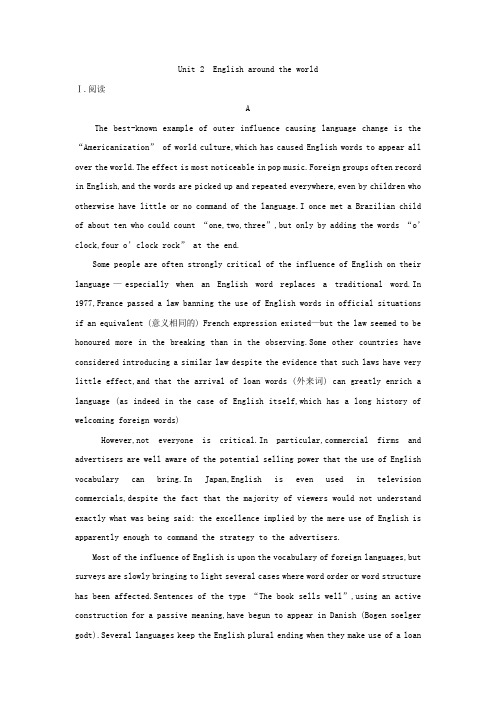
Unit 2 English around the worldⅠ.阅读AThe best-known example of outer influence causing language change is the “Americanization” of world culture,which has caused English words to appear all over the world.The effect is most noticeable in pop music.Foreign groups often record in English,and the words are picked up and repeated everywhere,even by children who otherwise have little or no command of the language.I once met a Brazilian child of about ten who could count “one,two,three”,but only by adding the words “o’clock,four o’clock rock” at the end.Some people are often strongly critical of the influence of English on their language—especially when an English word replaces a traditional word.In 1977,France passed a law banning the use of English words in official situations if an equivalent (意义相同的) French expression existed—but the law seemed to be honoured more in the breaking than in the observing.Some other countries have considered introducing a similar law despite the evidence that such laws have very little effect,and that the arrival of loan words (外来词) can greatly enrich a language (as indeed in the case of English itself,which has a long history of welcoming foreign words)However,not everyone is critical.In particular,commercial firms and advertisers are well aware of the potential selling power that the use of English vocabulary can bring.In Japan,English is even used in television commercials,despite the fact that the majority of viewers would not understand exactly what was being said: the excellence implied by the mere use of English is apparently enough to command the strategy to the advertisers.Most of the influence of English is upon the vocabulary of foreign languages,but surveys are slowly bringing to light several cases where word order or word structure has been affected.Sentences of the type “The book sells well”,using an active construction for a passive meaning,have begun to appear in Danish (Bogen soelger godt).Several languages keep the English plural ending when they make use of a loanword,and do not translate it into the native form,e.g.drinks.There are many other such cases.1.Why could the Brazilian child speak “one,two,three” in English?A.Because he had seen these words everywhere in the street.B.Because he had learnt how to tell the time in English.C.Because he had made himself master of English.D.Because he had heard these words in songs a lot.2.What can we infer about the law passed in France in 1977?A.It was strict.B.It was unfair.C.It was often ignored.D.It was strongly opposed.3.Why do some Japanese commercials use English?A.To follow the American trend.B.To become world-famous.C.To enrich Japanese.D.To increase sales.4.How is the last paragraph mainly developed?A.By providing examples.B.By making comparisons.C.By explaining grammar rules.D.By analyzing language change.语篇解读:本文是议论文。
人教新课标版高一必修1_Unit_2_English_Around_the_World-reading
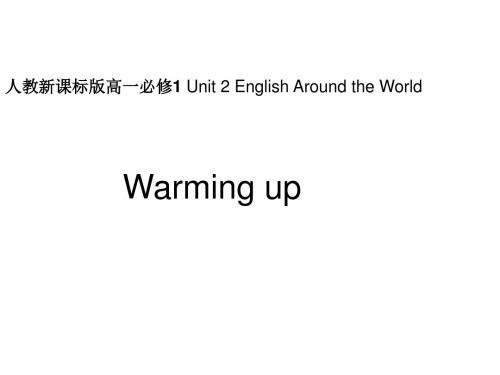
8. come up 上来, 走近; 被提出; (植物)发芽; (太 阳)升起 come up to sp 上某地来 come up with 提出 想出 He came up with a good idea in the meeting. 问题在会议中被提出来了。 •The problem came up in the meeting.
Find out the main idea for each paragraph
Time Between about ______ 1150 and AD450 _____
How is English developed?
England and based more on Spoken in ________ German _____.
语动词用单数。
More than one student wants to
go swimming.
高考链接
We advertised for pupils last autumn,
and got ___ 60. A. more than B. more of C. as much as D. so many as
1.Which of the following statement is true? A. Languages always stay the same B. Languages change only after wars
C. Languages no longer change
D. Languages change when cultures change
even if they don’t speak the same kind of English. adj. native land 祖国,故乡 native language 本族语言,母语 be native to The giant panda is native to Sichuan. n. 土著居民 study the habits of the natives even if= (even though) 尽管;即使 Even if the road is full of difficulty, I will never lose heart.
高考英语一轮复习必修1 Unit 2 English around the world基础知识考点梳理

必修1 Unit 2 English around the world●重点单词1.official adj.官方的;正式的;公务的→office n.办公室→officer n.官员2.voyage n.航行;航海3.native adj.本国的;本地的n.本地人;本国人4.actually adv.实际上;事实上5.base vt.以……为根据n.基部;基地;基础→basic adj.基本的;基础的6.gradual adj.逐渐的,逐步的→gradually adv.逐渐地,逐步地7.identity n.本身;本体;身份→identical adj.相同的,一样的→identify v.确定;认出;鉴定8.fluent adj.流利的;流畅的→fluently adv.流利地,流畅地→fluency n.流利,流畅9.frequent adj.频繁的;常见的→frequently adv.常常;频繁地→frequency n.频率;频度10.usage n.使用;用法;词语惯用法→useful adj.有用的→use n. & v.使用,利用11.command n. & vt.命令;指令;掌握→commander n.指挥员,司令员12.request n.& vt.请求;要求13.expression n.词语;表示;表达→express v.表达→expressive adj.富于表情的;有表现力的14.recognize vt.辨认出;承认;公认→recognizable adj.容易认出的;易于识别的→recognition n.认出;认识;识别15.accent n.口音;腔调;重音16.lightning n.闪电17.straight adv.直接地;挺直地adj.直的;笔直的;正直的●重点短语1.because of由于;因为2.come up 走近;上来3.at present 现在;目前4.make use of 利用5.such as 例如……;像这种的6.play a part in 扮演一个角色;参与7.ever before 从前8.even if/though 即使9.be based on 以……为基础10.over time 长期以来11.in the early days 在早期12.the same as 相同于●重点句型1.Today, more people speak English as their first, second or a foreign language than ever before.如今说英语的人比以往任何时候都多,他们有的把英语作为第一语言来说,有的把它作为第二语言或外语。
高中英语 必修1 (Unit2 English around the world the 4th period) 精品教案
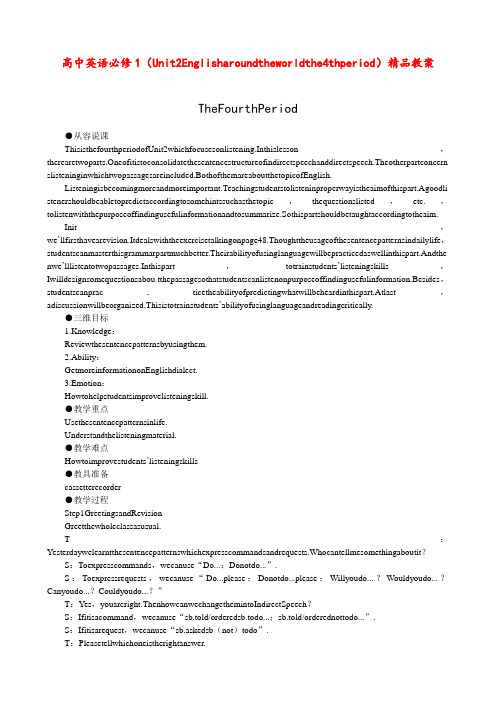
高中英语必修1(Unit2Englisharoundtheworldthe4thperiod)精品教案TheFourthPeriod●从容说课ThisisthefourthperiodofUnit2whichfocusesonlistening.Inthislesson,therearetwoparts.Oneofitistoconsolidatethesentencestructureofindirectspeechanddirectspeech.Theotherpartconcern slisteninginwhichtwopassagesareincluded.BothofthemareaboutthetopicofEnglish.Listeningisbecomingmoreandmoreimportant.Teachingstudentstolisteninproperwayistheaimofthispart.Agoodli stenershouldbeabletopredictaccordingtosomehintssuchasthetopic,thequestionslisted,etc.,tolistenwiththepurposeoffindingusefulinformationandtosummarize.Sothispartshouldbetaughtaccordingtotheaim.Init,we’llfirsthavearevision.Itdealswiththeexercisetalkingonpage48.Thoughttheusageofthesentencepatternsindailylife,studentscanmasterthisgrammarpartmuchbetter.Theirabilityofusinglanguagewillbepracticedaswellinthispart.Andthe nwe’lllistentotwopassages.Inthispart,totrainstudents’listeningskills,Iwilldesignsomequestionsabou tthepassagesothatstudentscanlistenonpurposeoffindingusefulinformation.Besides,studentscanprac ticetheabilityofpredictingwhatwillbeheardinthispart.Atlast,adiscussionwillbeorganized.Thisistotrainstudents’abilityofusinglanguageandreadingcritically.●三维目标1.Knowledge:Reviewthesentencepatternsbyusingthem.2.Ability:GetmoreinformationonEnglishdialect.3.Emotion:Howtohelpstudentsimprovelisteningskill.●教学重点Usethesentencepatternsinlife.Understandthelisteningmaterial.●教学难点Howtoimprovestudents’listeningskills●教具准备cassetterecorder●教学过程Step1GreetingsandRevisionGreetthewholeclassasusual.T:Yesterdaywelearntthesentencepatternswhichexpresscommandsandrequests.Whocantellmesomethingaboutit?S:Toexpresscommands,wecanuse“Do...;Donotdo...”.S:Toexpressrequests,wecanuse“Do...please;Donotdo...please;Willyoudo...?Wouldyoudo...?Canyoudo...?Couldyoudo...?”T:Yes,youareright.ThenhowcanwechangethemintoIndirectSpeech?S:Ifitisacommand,wecanuse“sb.told/orderedsb.todo...;sb.told/orderednottodo...”.S:Ifitisarequest,wecanuse“sb.askedsb(not)todo”.T:Pleasetellwhichoneistherightanswer.“____________,”LiMingsaidtohisteacher.A.Canyoubuymeanewwatch?B.Givemethatbook,C.Lendmeyourbike,D.CouldyouhelpmewithmyEnglish?S:IthinkDistherightanswer.T:Couldyoutellmewhy?S:BecauseAisnotlogical.BandCarecommands.Inlastperiodwelearntthatcommandsshouldbemadebypeoplewhohaveaut hority.SoIthinkhereDisright.T:Yourexplanationisperfect.Step2Talking(WorkbookP48)T:Great.Nowlet’spractisethesentencepatternsbymakingupdialogues.SopleaseturntoP48andlookatthepartoftalking.Ple a seworkingroupsoffour.Andchooseonesituationtorole-play.(5minutesforpreparation)T:Nowlet’sbegin.Possibleversion:Group1:A.(foreigner):Excuseme,couldyougivemeahand?B:Sure.Youseemtobelookingforsomeone.A:Yes.MyChinesefriendsandIpromisedtomeetattheexitofthesubway.B:Couldyouspeakabitslowly.Ican’tquitefollowyou.IguessyouarelookingforyourChinesefriends.A:I’msorry.Iwasn’tnoticingitjustnow.Yeah,wesaidthatwewouldmeethere—theexitofthesubwayat2p.m.Anditis2:15,butIstillcannotfindthem.B:Exit1orExit2?A:Whatdoyoumean?There’re2exits?B:Yes.Herearetwoexits.Soyoushouldbesurewhichoneiswhereyoupromisedtomeet.A:Isee.Iamsurethattheymustbewaitingformeattheotherexit.Thankyouverymuch!Group2:(P:parents;W:waitress;Y:you)P:Excuseme,couldyoutellmewherethetoiletis?W:Er...therestroom?Well,gostraightahead,anditwillbeattheendofthecorridor.P:Butwedonotneedrest.Wearejustlookingforatoilet.Y:ImeanwewanttogotheWC.W:WC?Wedon’thaveone.Y:NoWC!HowcanarestauranthavenoWC?W:I’msorry!ButwhatdoyoureallymeanbysayingWC?Y:It’saplacewherewecanwashhands.W:Ah,Isee.Well,gouptothesecondfloor.Y:Thankyousomuch!(Youandyourparentsgo uptwofloorsbutonlyfindemptyroomsthere.)W:Haveyoufoundit?Y:No,wewentuptwofloors,butwedidn’tfindatoiletbutemptyrooms.Group3:A:Excuseme,couldyouhelpme?B:Sure?What’sit?A:OurEnglishteacheristellingussomethingimportant,butIcanquitefollowher.She’sspeakingsofast.B:Yeah,she’sreallyspeakingfast.ThenhowcanIhelpyou?A:Couldyouasktheteachertospeakalittlebitslowly?B:OfcourseIcan,butwhydon’tyoudoso?A:Er...B:Isee.(StudentBputsup hishand)T:Yes?B:I’msorry,butwouldyouspeakalittleslowly?Step3Listening(Ⅰ)T:Yesterday,wehavelearntsomethingaboutdialectsintheUS.Todayletuslistentothedialoguespokenwithanaccent.Pleaseturntothelis teningpartonP14.Firstlistenandfindouthowmanypeoplethereareinthedialogueandwhotheyare.S:...T:Great!Nowpleaselistentoitagain,andanswerthequestionsonthetextbook.(afterlistening)Haveyougottheanswers?Nowcomparenoteswithyourpartner.T:Areyousureaboutyouranswersnow?Let’schecktogether.T:Youdidaverygoodjob.Nowwewilllistentoitagain.Afterthat,youshouldretellthestorytoyourpartner.See?S:...T:Soyousee,thereissomedifficultyforpeopletounderstandthedialects.Right?So whatwedowhilelearningEnglish?S:WecanlearnstandardEnglish.S:Idon’tthinkso,becausewehavelearntthatthere’snostandardEnglishactually.SoIthinkwhatweshoulddoistopronouncebetter,andusethecorrectwordsandgrammar.Step4Listening(Ⅱ)T:Byreadingthepassage“theroadtomodernEnglish“,wehaveknownEnglishisaworldlanguagewhichisspokeninmanycountriesandareas.Inthisperiodwewilllistentonatives peakersfromdifferentEnglish-speakingcountries.PleasemovetoP51andlookatListeningTask.Nowseveralstudentsina ninternationalhighschoolinShanghaiaredescribingwheretheycomefrom.Whatdoyouthinkyouwillhearintheirintroduc tion?S:Iguesstheywilltalkaboutthelocation,climate,people,custom,specificthings,andsoon.T:Youareveryclever.Weareintroducing someplace,mostoftimewewillgivesom edescriptionoftheclimate,people,custom,people,history,placesofinterests,andsoon.T:Listencarefully,thentellwhichtopicsarementioned.S:...T:Good.ThenIwillplaythetapeagain.Thistimeyoushouldtrytoguessthenameofeachstudent’scountry.S:...T:Goodjob.Thistime,youshouldpaymuchattentiontoeachstudent’sdescription.Afterlisteningitagain,youshoulddescribethecountryusingyourownwords.S:...T:Welldone!NowworkingroupsoffouranddiscusswithyourpartnerswhyEnglishisspokeninsomanyplacesaroundtheworl d.Makealistofthereasonsandthenreportyourgroupworkwithothergroups.Step5SummaryThisclasswehavereviewthegrammarpartbyusingitindailylife.Wehavepractisedreadingaswell.Welearnthelangua geinordertouseit.SoIadviseyoupractiseusingwhatwelearntdailysothattheycanbepartofyourknowledge.Step6HomeworkLookupthewordsleftinthevocabularyinthedictionary.●板书设计Unit2EnglisharoundtheworldTheFourthPeriodSentencepatternsGuessingthetopicsmentionedinthetape●活动与探究Thisactivityistodosomeresearchonthelisteningskills.Studentsarerequiredtosurftheinternettosearchforsomeinfor mationonadviceonimprovinglistening.●备课资料ColorsAmericanshaveusedcolorstocreatemanyexpressionstheyuseeveryday.Wesayweare“inthepink”whenweareingoodhealth.Itiseasytounderstandhowthisexpressionwasborn.Whenmyfacehasanicefresh,pinkcolor,itisasignmyhealthisgood.IfIlookgrayandashen,Imayneedadoctor.Redisahottercolorthanpink.AndAmericansuseittoexpressheat.InEnglish,thesmallandhotpeppers(辣椒)foundinmanyMexicanfoodsarecalled“redhots”,fortheircolorandtheirfiery(火辣辣的).Wesaythatfast,fierymusic,especiallythekindcalled“DixielandJazz”is“redhot”.Blueisacoolercolor.ThetraditionalbluemusicofAmericanblacksistheoppositeoftheredhotmusic.Itisslow,sadandsoulful.DukeEllingtonandhisorchestra(管弦乐队)recordedafamoussong,MoodIndigo(《深蓝的情调》),aboutthedeepbluecolor,indigo.Inthewordsofthesong,“Youaren’tbeenbluetillyou’vehadthatMoodIndigo”.Tobe “blue”,ofcourse,istobesad.Whilethecolorgreenisnaturalfortrees,itisanunnaturalcolorforhumans.Whensomeonedoesnotfeelwell,someonewhoissickforexample,wesayhelooksgreen.Whensomeoneisangrybecausehedoesnothavewhatsomeoneelsehas,wesayheis“greenwithenvy (忌妒)”.Somepeopleare“greenwithenvy”becausesomeoneelsehasmoredollars,or “greenbacks”.Dollarsarecalledgreenbacksbecausethat’sthecolorofthebacksideofthemoney.Thecolorblackisoftenusedinexpressions.Peopledescribeadayinwhicheverythinggoeswrongasa“blackday”.A “blacksheep”isthememberofafamilyorgroupwhoalwaysseemstobeintrouble.A“bla cklist”isillegal(非法的)now,butatonetime,someemployers sharedblacklistsofpeoplewhoshouldnotbegivenwork.Notallthe“black”expressionshavebadmeanings.Abusiness“intheblack”,forexample,isonewithprofits(利润).Acompany“inthered”islosingmoney.Redinkisusedtoshowlossesinafinancialreport.Profitsarewritteninblack.Ifsomeonetellsyoutoputsomet hing“inblackandwhite”,theywantyoutowriteitdown.Insomecases,colorsjustdescribeasituation.A“blackout”,inWorldWarTwo,waswhenalllightswereturnedofftomakeitdifficultforbomberplanestofindtheirtarget(目标)atnight.A“brownout”isanAmericanexpressionforreducedelectricalpowerwhichmakeselectriclightsdim.AmericanwomenusetheFrenchwordforredasthenameofthecoloredcosmetic(化妆品)whichtheysometimesusetobrightentheircheeks.It’sjustcalled“rouge”.Theyuseitespeciallywhentheyaregoingoutfortheevening,orasAmericanssay“topaintthetownred”.Thecoloryellowissometimesusedtodescribeacoward(胆小鬼).Apersonwhois“yellow”hasnocourage.Aperson’sskinmaybecomeyellowasaresultofdiseasesthatattacktheliver(肝).Yellowfeverisone.Inthepast,shipscarryingfevervictimsraisedaflagcalled the“yellowjack”.IntheUnitedStates,anactivisto rgan izationofoldpeoplecallsitselfthe“graypanthers”(灰豹).Thenamecomesfromthegrayhairofitsmembersandfromthepanther,afierceanimalofthelionorleopard(豹)family.WordsandIdiomsToeatcrow乌鸦肉根本没法吃,因此要一个人吃乌鸦,那肯定是非常难受的。
必修一(Unit2 English around the world the 1st period)
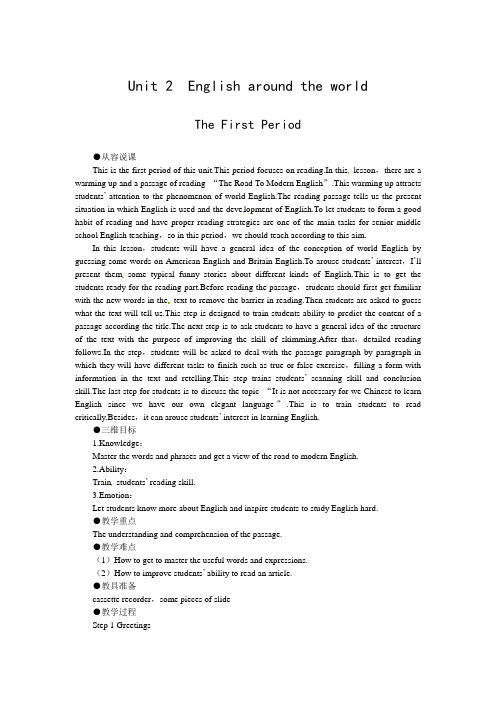
Unit 2 English around the worldThe First Period●从容说课This is the first period of this unit.This period focuses on reading.In this lesson,there are a warming up and a passage of reading “The Road To Modern English”.This warming up attracts students’ attention to the phenomenon of world English.The reading passage tells us the present situation in which English is used and the deve lopment of English.To let students to form a good habit of reading and have proper reading strategies are one of the main tasks for senior middle school English teaching,so in this period,we should teach according to this aim.In this lesson,students will have a general idea of the conception of world English by guessing some words on American English and Britain English.To arouse students’ interest,I’ll present them some typical funny stories about different kinds of English.This is to get the students ready for the reading part.Before reading the passage,students should first get familiar with the new words in the text to remove the barrier in reading.Then students are asked to guess what the text will tell us.This step is designed to train students ability to predict the content of a passage according the title.The next step is to ask students to have a general idea of the structure of the text with the purpose of improving the skill of skimming.After that,detailed reading follows.In the step,students will be asked to deal with the passage paragraph by paragraph in which they will have different tasks to finish such as true-or-false exercise,filling a form with information in the text and retelling.This step trains students’scanning skill and conclusion skill.The last step for students is to discuss the topic “It is not necessary for we Chinese to learn English since we have our own elegant language”.This is to train students to read critically.Besides,it can arouse students’ interest in learning English.●三维目标1.Knowledge:Master the words and phrases and get a view of the road to modern English.2.Ability:Train students’ reading skill.3.Emotion:Let students know more about English and inspire students to study English hard.●教学重点The understanding and comprehension of the passage.●教学难点(1)How to get to master the useful words and expressions.(2)How to improve students’ ability to read an article.●教具准备cassette recorder,some pieces of slide●教学过程Step 1 GreetingsT:Good morning,boys and girls!S:Good morning,teacher!Step 2 Warming upT:English is a widely used language.Do you know in which countries English is spoken as their native language?S a:The US,the UK,Australia,Canada...T:(a slide:Nancy:Oh,there you are.Now then,did you have a good flight?Joe:Sure,we flew all the way direct from Seattle to London.Nancy:You must be very tired.Did you sleep at all on the plane?Joe:No,not really.I’m very tired.Could I use your bathroom?Nancy:Why,of course.You don’t need to ask,just make yourself at home.Let me give you a clean towel.Joe:A towel?Nancy:Yes.Here you are.The bathroom is upstairs.It’s the second door on the left.(After a while)Nancy:Have you found it?Joe:Well,eh,yes,I mean no.I mean,I found the bathroom,but I didn’t find what I was looking for!)Here is a short dialogue.Read it and discuss with your partner:What is it that Joe can’t find in the bathroom?Why can’t he find it?S b:It is the toilet.T:And why?S c:Perhaps when Joe says “bathroom”,he means a place,where there is a toilet.But in Nancy’s eyes,it is a place where people can only have a bath.T:You are right.Do you know why there’s a misunderstanding between them?S d:Because they sp eak different kinds of English.T:Great.There’s more than one kind of English in the world.In some important ways they’re different.They’re called world English.Can you guess what they include?S e:Canadian,British,American,Australian and Indian English.T:Right.So you know even two native speakers of English may still not speak the same kind of English.Look at the examples on P9.Now try to guess which of the following words are British English and which are American English.Suggested answers:Am.English:mom;on a team;rubber;gasBr.English:mum;in a team;eraser;petrolStep 3 New WordsT:From today on,we’ll learn something about English around the world.First of all,let’s get familiar with the new words.Yesterday I asked you to read the new words and look up the meaning of them.Now let’s have a game in which one of you tells us the meaning or the explanation of the words and the others guess which word it is.Let’s go!Suggested explanation:1.include:have something or somebody as one of a group.e.g.:The tour included a visit to the Science Museum.2.play a role in:have a part in3.international:connected with two or more countries4.native:(1)connected with the place where you have always lived or have lived for a long time(2)a person who lives in a particular place,especially sb. who has lived there a long time5.elevator:lift6.flat:(1)having a smooth surface (2)(Br. E)a set of rooms for living in7.apartment:(Am. E)a set of rooms for living in8.modern:of the present time or recent timee up:to move toward10.culture:the customs and beliefs,art,way of life and social organization of a particular country or group11.actually:really;in fact12.present:(1)existing or happening now (2)being in a particular place13.rule:control14.vocabulary:all the phrases and phrases you learnage:the way in which words are used in a language16.identity:who or what sb./sth. isernment:the group of people who are responsible for controlling a country or a state18.rapidly:fastT:That’s great!You’ve made a good preparation.Now please read the words together.(show words and explanations on the slide)Step 4 Pre-readingT:Just now,we’ve known that there’re many kinds of English in the world.Then why are there so many kinds?Ss:We don’t know.T:Anyway,we’ll find out the cause today.Now read the title of the passage “the road to modern English”.What do you think it will tell us?S f:I guess it will tell us the development of English.Step 5 SkimmingT:Now let’s find out whether your answer is right.So please read the passage fast in silence and find out the main idea of each paragraph.Suggested answer:Para.1:Brief introduction of the change in English.Para.2:An example of different kinds of English.Para.3:The development of English.Para.4:English spoken in some other countries.Step 6 ScanningT:You’ve mastered the structure of the passage.Now please read para.1 and 2 loud in detail.T:(several minutes later)Have you finished?Here’re some statements of which some are right while some not.Read them and then tell whether they are true or false.If false,please find out the mistake and correct it.(slides:1.Most of the English speakers in the 16th century lived in England.2.More and more people use English as their first or 2nd language.3.The US has the largest number of English speakers.4.Native English speakers can understand everything because they speak the same kind ofEnglish.)S g:The first one is true.S h:The second one is true.S i:The third one is false.China has the largest number of English speakers.S j:The fourth one is false.Native English speakers may not be able to understand everything because they do not speak the same kind of English.T:You did a very good job.Now please read para.3 after the tape.And then fill in the form onThe Road To Modern EnglishThe cause:Cultures communicate with one anotherTime Things that happenedBetween AD 450and 1150Based on German1150 to 1500 Less like German;more like French→why?→because Frenchmen ruled England thenIn the 1600’s Shakespeare broadened the vocabulary.A big change in English,giving its own identity→why?→caused by “American Dictionary of the English language”written by Noah WebsterLater British people brought English to AustraliaT:We know culture communication brings about changes in English.Can you think of any effect that Chinese has on English?S k:In English there are some Chinese words such as gongfu,long time no see,...T:Great!With more closely communication of culture,English is changing more frequently.T:As we all know,English is spoken as the native language mostly in western countries.Then what about English in some other parts of the world?After reading the last paragraph,would you please say something about the present situation of English in your own words?S l:It is also spoken as a foreign or 2nd language in many other countries.For example,in India,it is used for government and education.In some African and Asian countries,it is also spoken,such as in South Africa,Singapore and Malaysia.While in China,the number of English speakers is increasing fast.T:Quite good.Step 7 DiscussionT:So far,we’ve known that English is becoming more and more important in China.It has been an important subject for Chinese students.But someone say that Chinese is a much more elegant language.So it is more important for us to master it and it is not so necessary for us to master a foreign language.Do you agree with this opinion and why?Suggested answer:I don’t agree with it.With the cultural communication becoming more and more frequent,the chance to contact foreigners,exported goods,international conferences,and so on,is more and more.As the most widely used language,English is regarded as the language used in most international situations.Thus,if we want to keep up with the times,we’d better master English and use it as a tool.Step 8 Summary and homeworkT:Today we’ve learned an article on “the road to modern English”.After class,you shouldread it again and again to get the idea of the text further.Do the exercises of comprehending and try to tell your partner something about English in our own words.That’s all for today.Class is over.●板书设计Unit 2 English around the worldThe First PeriodNew words:Main idea of each para-graph:... ...... ...●活动与探究This activity is to make research into differences between different kinds of world English and some words from other languages in English.Divide students into two groups to do research and fill the following table in their free time.Differences Pronunciation Spelling MeaningUsage...Words from other languages Chinese Japanese French Spanish German...●备课资料Soon There Will Be No Such Thing As “Wrong”English In this article:Senior Indian journalist Gautaman Bhaskaran says that English is so flexible that one day there will be too many variations around the world.English is a victim of its own success.The other day The Times in London displayed a cartoon showing an excited schoolboy flaunting his test scores:“I done good in English.”Days later,editors of the Oxford Dictionary of English rued the spread of what they termed “greengrocer’s English”.Grammar and syntax,they regretted,were going out of fashion.Others in England—in the Oxf ord University Press,the BBC and so on—said the incorrect use of cliches were marring the smooth flow of a great language whose ability to imbibe and absorb has been one important reason for its success.This success also stems from the language’s unique position of being the only one spoken in most parts of the world.Really,English has no boundaries.Even in countries such as Japan and China,which were not colonized by Britain,English is making a determined “conquest”.Unfortunately,such a conquest is not always welcome because a language sometimes doubles as a political weapon.At some point it ceases to be just a means of communication and English is a classic example of this.It has always led a troubled life.It has been disliked,even hated,largely because the people who originally spoke English conquered,colonized and terrorized half the world,or just about.The animosity to the language continues,at least in some places.The bitterness that the French,for instance,have for English is a g ood example of a language being giving a quasi-political role in society.Fortunately,this aversion does not run as it did some years ago,and there is a growing realization that English is the lingua franca.China and Japan,among a host of other nations,have been making serious efforts to promote the language.Some months ago there was a hue and cry in Singapore over the spread of “terrible English”which the authorities called “Singlish”.“Down with it!”they said,and urged Singaporeans to learn correct English,the phenomenal flexibility of which has often made things difficult for those who have to use it every day.Today even university graduates find it hard to pen a couple of correct sentences in it.More horrifying is that many teachers and university vice-chancellors speak and write poor and ungrammatical English.Often,they are found to be out of touch with what is called “usage”and,as we all know,this is one of the pillars the language rests on.Yet,despite the mess that English is in India,the nation has—more than two centuries after Samuel Johnson wrote his English dictionary—become the hottest destination for top lexicographers.The new 10th revised edition of the Oxford Concise English Dictionary includes hundreds of Indian words.Leading the list of 600 Indian English entries are “Hindutva”(Hindu identity),“dada”(older brother),“panchayat”(local administration),“chai”(tea),“pani”(water),“puri”(a dish made of wheat)and “dosa”(rice pancake).In fact,Indian words from 20 per cent of entries and rank as the third-largest component after American and Australian English segments.Other former British colonies such as New Zealand,South Africa and the Caribbean islands follow the Indian English collection of words.English,despite its hiccups,is endearing to the common Indian man or woman.About 150 years after Lord Macaulay introduced the language in India to create “babus”(clerks)for the British bureaucracy,70 million Indians speak English,a number that is higher than that in Britain.However,there is a sneaking fear among Puritans that with this kind of sp read,English may stop being English.While the French have fanatically preserved the purity of their language,the English have liberally allowed other influences to affect their lingo.So,what is seen as its strength —the fact that people all over the world understand it—can be an undermining obstacle.There might be a serious problem if every state or continent were to have its own version of English.As one writer said:“There is a risk in relentless atomization.”With too many variations of the language,a time may come when one group of English-speaking people may not be able to understand another.This is happening.Hear the way Singaporeans speak English.Listen to the Australians pronouncing “e”;it sounds like “a”.A few of the films made lately by British directors Ken Loach and Mike Leigh had to have subtitles in English.Accents in the north of Britain can be hard for people in the south to understand,let alone those outside the island.The point is,no language must be allowed such flexibility—anything goes in the name of functional communication—that people begin to take liberties with it.Ultimately,there may be no such thing as wrong English.The schoolboy in the Times cartoon was doing just that.He knew nobody would scold him for getting his English wrong.不久以后就没有“错误的”英语这一说了英语成了自身成功的牺牲品,前几天,伦敦的《泰晤士报》刊登了一幅漫画,上面画了一个兴高采烈的男学生炫耀他的考试成绩:“I done good in English”(我的英语成绩不错)几天后,《牛津英语词典》的编辑们对他们所定义的“菜贩子讲的英语”的传播大为悲叹他们感到遗憾的是,语法和句法都过时了其他一些在英国——牛津大学出版社、BBC(英国广播公司)等的人说:不正确地使用陈腐辞藻损害着一种伟大语言的流畅性,英语博采众长的能力是其成功的一个重要原因英语的成功同样源自其独特的地位,它是在世界的大多数地区都使用的惟一一门语言的确,英语没有国界甚至在没有被英国所殖民过的国家,诸如中国和日本,英语正进行着决定性的“征服”不幸的是,这种征服不总是受到欢迎,因为一种语言有时会被兼作政治武器有时候,语言不再仅仅是一种沟通的工具,而英语又是这种情况的一个经典范例英语总是摆脱不掉困扰它曾不受人喜欢,甚至遭人厌恶过主要是因为最初讲英语的人征服、殖民和胁迫了世界的一半地区,或者说将近一半地区对英语的敌意还在持续着,至少在某些地方仍是这样语言在社会中被赋予了一种准政治的作用,比如法国人对英语的嫉恨就是一个很好的例子幸运的是,这种对英语的厌恶不像多年前那么严重,人们越来越认识到英语其实是一种混合语在众多国家,比如中国和日本,一直在大力推广英语的使用几个月前在新加坡,人们大声抗议被当局称作“新加坡式英语”的“可怕的英语”正在到处传播“够了!”他们说道,并督促新加坡人学习正确的英语对于那些每天都必须使用英语的人来说,英语异常的灵活性经常把事情搞得很困难现在,即使是大学毕业生都会发现写几句正确的英文句子很难更可怕的是,许多教师和大学副校长说着和写着糟糕的不合语法的英语人们经常会发现这些人不注重语言的“用法”,正如我们都知道的,用法是语言的支柱之一然而,尽管英语在印度被搞得一团糟,在塞谬尔·约翰逊编写了他的英语字典两个多世纪以后,这个国家已经成为顶级词典编纂者们最热门的词汇来源地《牛津简明英语词典》新近出版的第十修订版收录了几百个印度词汇在600条印度英语词条中最重要的词汇是“Hindutva”(印度身份),“dada”(长兄),“panchayat”(地方行政机关),“chai”(茶),“pani”(水),“puri”(用小麦做的食品),以及“dosa”(烤米饼)实际上,印度词汇构成了20%的词条并且在美国和澳大利亚英语条目之后,成为第三大词典词汇组成部分从其他前英国殖民地,比如新西兰、南非和加勒比海群岛所收录的词汇都位居印度英语之后普通的印度人都还是喜欢英语的,尽管有时会有些小问题麦考利勋爵将英语引入到印度并为英国官僚机构创造了像“babus”(职员)这样的词汇,150年之后,有7000万的印度人在讲英语,人数比在英国讲英语的人都要多然而,清教徒却普遍心存恐惧,怕如此下去英语会变得面目全非了与法国人狂热地保护法语纯洁性的做法不同,英国人很大方地接受了外界对其影响结果是,世界各地的人都懂英语——可以说这一优势削弱了英语的纯洁性如果每个国家或大陆都有其版本的英语的话,那么问题可能就严重了正如一位作家所说的:“无休止使英语分化是危险的”英语如果有太多的变种的话,会出现这样的情况:当一群讲英语的人可能听不懂另一群人所讲的英语这种情况事实上正在发生您来听听新加坡人说的英语听澳大利亚人发“e”这个音的;听起来就像发“a”这个音最近由英国导演肯·露弛和麦克·雷导演的几部电影中不得不加上了英语字幕,因为英国北部人的口音让英国南方的人很难听懂,更不用说英国以外的人了问题的关键是,没有什么语言可以允许有如此的灵活性——以至于人们借实际沟通之名,就可以随意使用了最终的结果是:可能不会有错误的英语这回事了在《泰晤士报》卡通中的男学生正是这么做的因为他清楚没有人会指责他所讲的英语不正确。
Unit2 English around the world (人教版新课标)解析版

“地毯式过单词”(人教版新课标)必修一Unit2 English around the world一、单词拼写(根据汉语或首字母提示写出单词的完全形式)1.I made friends with the (当地人),and they were concerned about me.【答案】natives【句意】我和当地人交朋友,他们都很关心我。
2.I paid a visit to Russia which is rich in natural resources and the travel(使丰富) my horizons.【答案】enriched【句意】我参观了资源丰富的俄罗斯,这次旅行丰富了我的视野。
st week some city o suggested the city might be interested in turning the old theater intoa museum and public meeting place.【答案】officials【句意】上周一些官员表态城市公众可能对把老剧院改造成博物馆和会议室感兴趣。
4.The ship will start its maiden (航行) next Monday,which makes me unable to keep calm.【答案】voyage【句意】下周一这艘船将开始它的第一次航行,这使我激动不已。
5.If you set down just one more new word each day,in the next year you will increase yourv by more than 300 words.【答案】vocabulary【句意】如果你每天记下一个单词,明年你就学会三百多个。
6.As you know,bamboo always stands s ,so it represents “noble”and “strong-willed”.【答案】straight【句意】正如你所了解的,竹子笔直代表着高贵与意志坚强。
高中英语必修一-Unit2-English-around-the-world重点单词短语及句型总结

高中英语必修一-U n i t2-E n g l i s h-a r o u n d-t h e-w o r l d重点单词短语及句型总结(总3页)-本页仅作为预览文档封面,使用时请删除本页-高中英语必修一Unit2 English around the world重点单词、短语和句型总结一、重点单词和短语1. because of 因为(后接名词、代词)2. a native speaker of English 以英语为母语的人3. more than one + n. 不止一个……more than one kind of English 不止一种英语4. come up走上前来;被提出;(太阳、月亮)升起He came up to me and said hello to me.The sun has come up.Your question came up at the meeting.come up with想出,提出(主语是人)I come up with a good idea. 想出一个好点子。
5. be based on以……为基础The film is based on his novel. 这部电影是根据他的小说改编的。
6. increase/enlarge vocabulary 增加/扩大词汇(量)7. make use of 利用;使用make full use of 充分利用 make the best of = make the most of 更好地利用We should make full use of time to recite English words.8. such as 例如Sweet food, such as chocolate can make you fat.=Such sweet food as chocolate can make you fat.9. command sb. to do sth. 命令某人做某事command that sb. (should) do sth. (从句中谓语用虚拟语气)obey the captain’s commands 服从船长的命令under the command of sb.=under sb’s command 在……的指挥下have a good command of English. 精通/熟练掌握英语10. request sth. 要求/请求得到,索要某物request sb. to do sth. 要求某人做某事= request that sb. (should) do sth.(从句中谓语用虚拟语气)11. play a part in 在……中担任角色/起作用12. make sense 有道理;有意义;讲得通13. hold on 别挂(电话); 坚持14. in the direction of 朝……方向from the direction of 来自……方向in all directions = in every direction 向四面八方15. put sth. down 写下;记下;镇压16. have fun with sth. 以……为乐17. believe it or not 信不信由你(常用作插入语,也叫独立成分)重点句子1. Native English speakers can understand each other even if they don’t speak the same kind of English.2. It was based more on German than the English we speak at present.3. By the 1600’s Shakespeare was able to make use of a wider vocabulary than ever before.4. One reason is that English has a large vocabulary.5. Believe it or not, there is no such thing as standard English.。
高一英语必修一Unit2课文翻译

高一英语必修一Unit 2课文翻译Unit 2 English around the worldReadingTHE ROAD TO MODERN ENGLISH通向现代英语之路At the end of the 16th century, about five to seven million people spoke English. 16世纪末期大约有5百万到7百万人说英语. Nearly allof them lived in England.几乎所有这些人都生活在英国。
Later in thenext century, people from England made voyages to conquer other parts of the world and because of that, English began to be spoken in many other countries.后来,后来,在17世纪英国人开始航海征服了世界其它地区。
于是,许多别的国家开始说英语了。
Today, more people speak English as their first, second or foreign language than ever before.如今说英语的有的是作为他们有的是作为第一语言来说,有的是作为人比以往任何时候都多,他们有的是作为第一语言来说,第二语言或外语。
Native English speakers can understand each other even if they don’t speak the same kind of English. Look at this example:以英语作为母语的人,即使他们所讲的语言不尽相同,也可以互相交流。
请看以下例子:British Betty: Would you like to see my flat?英国人贝蒂:“请到我的公寓(flat)里来看看,好吗?”American Amy: Yes, I’d like to come up to your apartment.美国人艾米:“好的。
高中英语必修一Unit2 English around the world 知识点

Unit 2 English around the worldWarming up1.More than多于,超过= over More than two thirds of the students went to see the movie.不仅,不只=only They are more than schoolmates. They are close friends.拓展:more A than B 与其说是B,不如说是A。
He is more hard-working than bright.2.In some ways 在某种程度上,在某些方面All the way 自始至终;by the way 顺便说一下;He support her all the way. By the way, there is a telephone message for you.3.Because of 因为,由于与because 的辨析Because of the storm, he didn’t go there; ( 后接名词/代词/宾从)Please be brief because i am in a hurry (引到原因状语)4..even if = even though Even if / though we don’t like it, we must do it.I’ll get there, even though / if I have to walk.Even though there is possibility I’ll be turned down, I want to express my true feeling to her.e up走过来,接近She came up and my heart was going to jump out of my throat.引申:发生Something has come up, so I won’t be able to see you tonight.(太阳)升起,上升The sun came up.引申:破土发芽The plants are just beginning to come up.归纳拓展:come up with 提出,想出come out 出版,发表The dictionary is being printed and it will soon come outCome across (偶然)遇见,碰到Walking in the street, I come across my Princess Charming.6.Over 在。
人教版高一英语必修一Unit_2_词汇教学-2023年学习资料

辨析-·base与basis-·base表示具体含义,意为“根基”“基-础”“底座”-·Eg:the ba e of a building建筑物的根基-basis表示抽象含义,即“非物质方面的基-·Eg:the e onomic basis经济基诎
·present-n.adj.-vt.-·1作形容词时,若表示“在场的,出席-的”,通常做表语或后置定语, 定词组-为be present at,,意为“出席”,其反义词组-为be absent from,意为“缺 ”;若表示-“现有的,现在的”,通常作前置定语。-0-eg:Were you present when t e news was-announced?-You can't use it in its present condition
·voyage-·n.航行,航海v.航行,航海-·短语:-·make/take/go on a voyag 去航海-·on the outward voyage在出航途中-·on the homeward voya e在回航途中-Eg:The Titanic sank on its maiden voyage.
·搭配:present sth to sb把某物捐赠给某人-●-present sb with sth把某 送给某人-present sb to sb把某人介绍给某人-Eg:When Mr.Brown left t e firm,the director-presented a gold watch to him.-Th mayor presented the winner with a-silver cup.-Mr.Smi h,may I present Mr.White?
·拓展:-·because of的同义短语-hanks to多亏,由于;作表语或状语-owing to由于 作表语或状语-as a result of由于;作状语-on account of因为;作状语-due t 不能用于句首由于;作表语或状
- 1、下载文档前请自行甄别文档内容的完整性,平台不提供额外的编辑、内容补充、找答案等附加服务。
- 2、"仅部分预览"的文档,不可在线预览部分如存在完整性等问题,可反馈申请退款(可完整预览的文档不适用该条件!)。
- 3、如文档侵犯您的权益,请联系客服反馈,我们会尽快为您处理(人工客服工作时间:9:00-18:30)。
The Seventh Period●从容说课This is the latest period of this unit.In this part,I advise taking summing up,learning tip and project as the targets.This is a period of summary and consolidation of words and phrases,a summary of English around the world,and a summary of grammar will all be dealt with.Students are the key role of a class.So I think it is better to let students summarize by themselves.After that,if there is something missing,they will be helped by teachers.Besides the summary part,project will also be considered.This part offers students a chance to do many things by themselves,which can of course improve students’ ability.Now that it is not a course of teaching knowledge but an ability-training one,it is better to let students think more to solve the questions.Maybe group work will be good in effect.Then students report the result of their group work.●三维目标1.Knowledge:Review all the knowledge of words,phras es,expressions,grammar,and the language.2.Ability:Deal with the part of project to know something about code.3.Emotion:Create some codes.●教学重点The consolidation of the knowledge learnt before.●教学难点How to help students sum up and master the knowledge.●教具准备slides●教学过程Step 1 GreetingsGreet the whole class as usualStep 2 Summing up the knowledge ofEnglishT:Today we are here having the last period of this unit.After reading this unit,what have you learnt?First what have you learnt about different kinds of English.Would you work in groups of four to discuss it?A nd then report it in the form of a table.(discuss for 5 minutes)Now exchange ideas with other group freely.Step 3 Summing up words and expressionsT:We have got much information about the language.Then what words and expressions havewe learnt?Discuss with your partner and make a list.S:Noun:role,native,culture,vocabulary,usage,identity,government,phrase,command,request,standard,accentVerb:include,rule,command,request,retell,recognizeOther expressions:play a role (in);because of;come up;be present at;such as;be polite to Then please use the right forms of the words or phrases to fill in the blanks:1.The famous actor said he looked forward to ____________ in the movies directed by talented Zhang Yimou.2.The sports meet was put off ____________ the bad weather.3.After reading the text,we were told to ____________ the passage using our own words.4.He changed so much that I didn’t ____________ him at first.5.More than half of the people who were invited ____________ the meeting.6.In this vacation,I plan to do many things ____________ traveling to Hong Kong.7.Nobody dared to go against his ____________ that everyone (should)leave until 8 o’clock.8.The problem ____________ at the meeting has been solved.Suggested answers:1.playing a role2.because of3.retell4.recognize5.were present at6.includingmand ing upT:A good summary.Then would you please fill in the blanks with correct forms of words.Step 4 Summing up grammarIn this unit,we met across a new grammar item:request and command.Now recall the sentence patterns with your partner.Command:Do/Do not do...Request:Do/Do not do...please.Can you do...?Could you do...?Will you do...?Would you do...?Step 5 Learning tipsT:We know interest in the mother of success.If you find that the thing that you are doing is not so interesting,it’s not so likely that you will succeed.It is the same case with the study of English.So when you learn English,you’d better try to find fun in the study.For example,try to make jokes using words which have different meanings.For example:①Don’t rock that baby on the rock while playing that rock music.②I wish to wish the wish you wish to wish,but if you wish the wish the witch wishes,I won’t wish the wish you wish to wish.③If white chalk chalks white on a black blackboard,will black chalk chalks black on a white whiteboard then?Will you find out more funny things in studying English?Some slang in America:Beats Me 林先生刚到美国时,经常不经意间听到“Beats me”这句话,心想总不会叫人揍自己吧!例如,有人问:“When is this rain supposed to stop?”对方可能回答“Beats me !”若再问:“Where are your parents?”,对方回答也可能是“Beats me!”这句话如此管用,几乎适用于任何场合,那么到底是什么意思呢?林先生求教于人,得知其意是“I don’t know”——我不知道,我无法回答。
Now You Are Cooking 老吴与同事John聊天,他的女秘书敲门进来报告说,他此次开会所要的简报资料已制作完成,请John过目。
John 接过资料审视后说:“Now you are cooking.”老吴听了一怔,不解地问他是怎么知道她此时正在煮东西。
John笑说,他只是夸她这次干得不错而已,并不知道她在煮东西。
原来,Now you are cooking此处系指“Well done”,与东西无关。
Food Free Zone 章先生又饥又渴地赶到了图书馆借书。
一走进图书馆,看到展示区上挂了“Food Free Zone”的告示牌,心想美国公立图书馆真不错,还提供免费食物(free food),于是直奔该区寻找免费食物填肚,可怎么也找不着。
